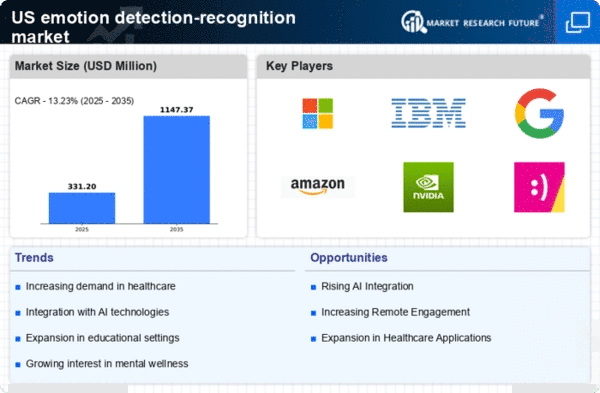Technological Advancements in AI
The rapid evolution of artificial intelligence (AI) technologies is a primary driver for the emotion detection-recognition market. Innovations in machine learning algorithms and neural networks enhance the accuracy and efficiency of emotion recognition systems. As AI capabilities improve, the market is projected to grow significantly, with estimates suggesting a compound annual growth rate (CAGR) of over 25% through 2030. This growth is fueled by the increasing demand for sophisticated emotion analysis tools across various sectors, including marketing, healthcare, and education. Companies are investing heavily in AI research and development to create more nuanced and context-aware emotion detection systems. The integration of AI with other technologies, such as natural language processing and computer vision, further propels the market forward, enabling more comprehensive solutions that can interpret human emotions in real-time.
Integration with Wearable Technology
The proliferation of wearable technology is emerging as a significant driver for the emotion detection-recognition market. Devices such as smartwatches and fitness trackers are increasingly equipped with sensors capable of monitoring physiological signals associated with emotional states. This integration allows for real-time emotion detection, providing users with insights into their emotional well-being. Market analysts predict that the wearable technology segment could contribute to a substantial increase in the overall market size, with estimates suggesting a growth rate of around 20% annually through 2026. As consumers become more health-conscious and seek to understand their emotional health better, the demand for wearables that incorporate emotion detection features is likely to rise. This trend not only enhances user experience but also opens new avenues for data collection and analysis within the emotion detection-recognition market.
Rising Demand in Retail and Marketing
The retail and marketing sectors are increasingly leveraging emotion detection-recognition technologies to enhance customer engagement and personalize experiences. By analyzing consumer emotions, businesses can tailor their marketing strategies to resonate more effectively with target audiences. This trend is evidenced by a growing number of companies adopting emotion recognition tools, with market analysts estimating that the retail sector alone could account for approximately 30% of the total market share by 2027. The ability to gauge customer sentiment in real-time allows brands to adjust their offerings and improve customer satisfaction. As competition intensifies, the integration of emotion detection technologies becomes essential for businesses aiming to differentiate themselves in a crowded marketplace. This shift not only drives revenue growth but also fosters long-term customer loyalty, making it a crucial factor in the evolution of the emotion detection-recognition market.
Increased Focus on Mental Health Solutions
The heightened awareness surrounding mental health issues is significantly influencing the emotion detection-recognition market. As society increasingly recognizes the importance of mental well-being, there is a growing demand for tools that can assist in monitoring and analyzing emotional states. This trend is particularly relevant in educational and therapeutic settings, where emotion recognition technologies can provide valuable insights into student and patient behaviors. Market projections indicate that the mental health sector could represent a substantial portion of the emotion detection-recognition market, potentially reaching a valuation of $2 billion by 2028. The integration of these technologies into mental health applications not only aids in early detection of emotional distress but also enhances the effectiveness of therapeutic interventions. Consequently, this focus on mental health solutions is likely to drive innovation and investment within the emotion detection-recognition market.
Regulatory Support and Standardization Efforts
The establishment of regulatory frameworks and standardization efforts is playing a crucial role in shaping the emotion detection-recognition market. As the technology matures, there is a growing need for guidelines that ensure ethical use and data privacy. Regulatory bodies are increasingly recognizing the potential of emotion detection technologies, leading to initiatives aimed at fostering innovation while safeguarding consumer rights. This support is likely to encourage investment in the market, as companies seek to comply with emerging regulations. Furthermore, standardization can enhance interoperability among different emotion detection systems, facilitating broader adoption across industries. Analysts suggest that these regulatory developments could lead to a more robust market environment, potentially increasing market size by 15% over the next five years. As stakeholders navigate the complexities of compliance, the emphasis on regulatory support is expected to drive growth and innovation within the emotion detection-recognition market.















